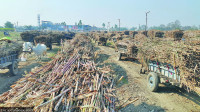Money
‘Over-reliance on India has hit economy hard’
Nepal’s economy has failed to withstand the shock of the third Indian blockade that is now running in the third month—previous blockades were imposed in 1988 -89 and in 1970—due to the country’s excessive dependence on the southern neighbor.
Nepal’s economy has failed to withstand the shock of the third Indian blockade that is now running in the third month—previous blockades were imposed in 1988 -89 and in 1970—due to the country’s excessive dependence on the southern neighbor.
According to Nepal Rastra Bank’ study report titled ‘Impact of Unofficial Indian Embargo on Nepal’, Nepal did not learn lessons from the past two blockades by the southern neighbour and failed to develop a self-reliant economy capable of bearing such shocks.
The central bank has said that Nepal’s dependence on India continued to grow considerably since the second embargo in 1989 as Nepal failed to assess the possibility of such an embargo by India.
According to the NRB, Nepal’s trade with India was 34.3 percent in 1988-89, which reached 63.7 percent in the last fiscal year (2014-15).
In view of the ongoing unofficial blockade by India this time, the NRB has projected that the country’s economy could witness a negative growth (-0.9 percent) this fiscal (2015-16). The last time Nepal witnessed a negative growth was in 1982-83.
Nepal is reeling from the unofficial blockade by India since September 23.
Earlier, India had imposed a blockade in 1970 for building the Araniko Highway to a Chinese border point. India imposed a trade embargo second time in 1989 for purchasing arms from China.
But, Nepal’s economy in the past two events did not suffer as much as it is now. As the impact of the blockade in 1989, Nepal’s economic growth decreased to 4.5 percent in 1990-91 from 5.2 percent the previous fiscal. Likewise, as a result of the blockade in 1970, economic growth was limited to 1.7 percent in fiscal 1970-71 from previous year’s 9.8 percent. “Nepal’s dependence on foreign products grew after 1990s as Nepal adopted liberal economy without enhancing domestic capacity to export and proper market inspection mechanism,” said Posh Raj Pandey, a trade expert. “So, Nepali products failed to compete when foreign products flooded the domestic market.”
While country’s overall dependence on foreign countries increased after 1990s, reliance on India grew exponentially. “It is also due to the fact the Nepal didn’t review the exchange rate regime with India time to time,” said Pandey. “Even if peg with Indian currency was maintained, there should have been a periodic review on pegged rate.”
According to the NRB, as Nepal’s economy turned more consumption-driven as a result of liberal economic policy, Nepal’s dependence on foreign goods surged. There were only 74,000 vehicles plying the road in 1990, which has now crossed two million. Annual import of fuel was worth less than Rs 1 billion then, which now has reached Rs 111 billion. Cooking gas was virtually not used until 1989 and share of traditional energy source such as firewood was 95 percent against 77 percent now.
“The hydropower production was sustaining the domestic demand of energy to a large extent,” said the NRB. But, now, energy supply is only 780MW against the total demand of 1300MW.
As Nepal is dependent on these products on foreign countries, mostly India, the economy has now faced the impact of the blockade.
“The country is currently witnessing fuel and medicine crisis due to the blockade. If the current situation continues, we will also see a crisis in food availability,” said Pandey. “This shows that we should urgently adopt a state policy by keeping energy and food security as a part of national security.”
In this context, the central bank has suggested maintaining buffer stock of essential goods such as fuel, food and agriculture products, opening all nine border points with China for bilateral trade and upgrading existing two routes connecting China—Rasuwagadhi and Tatopani.
The central bank has also suggested Bilateral Investment Protection and Promotion Agreement (Bippa), Project Development Agreement and Power Trade Agreement with China. Promoting export and food security and focusing on producing raw materials for industries within the country are other suggestions.
The central bank has also suggested that the country should declare energy crisis and adopt a fast-track mechanism to develop hydropower projects.




 9.93°C Kathmandu
9.93°C Kathmandu












